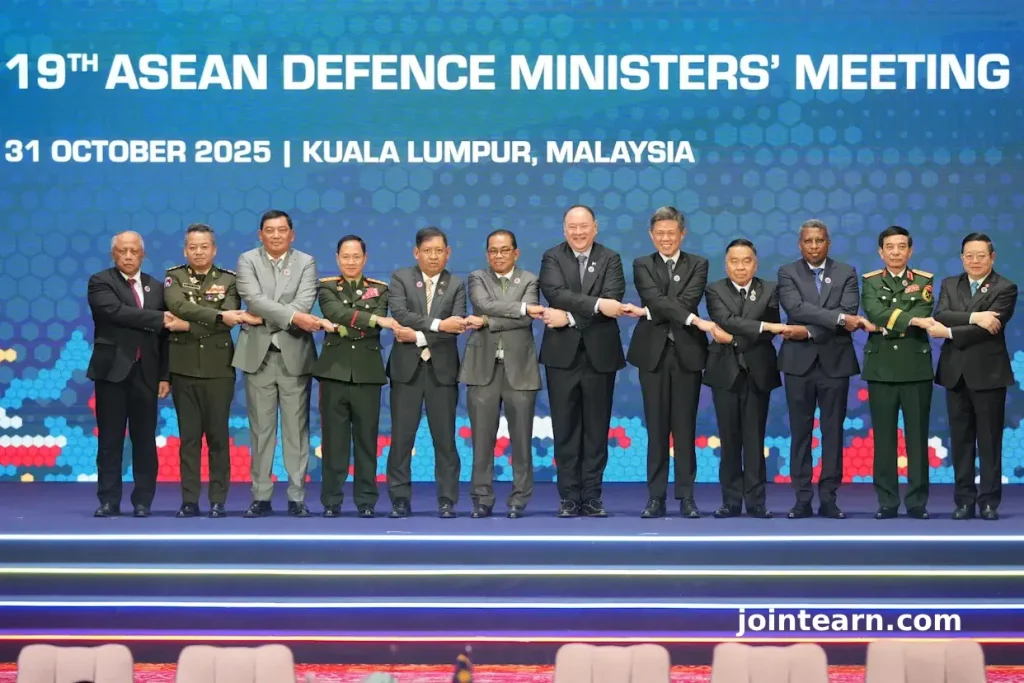
KUALA LUMPUR, Malaysia — October 31, 2025 — U.S. Defense Secretary Pete Hegseth reaffirmed Washington’s determination to “stoutly defend” its Indo-Pacific interests on Friday, following tense but constructive talks with Chinese Defense Minister Dong Jun on the sidelines of the Association of Southeast Asian Nations (ASEAN) Defense Ministers’ Meeting in Malaysia.
The meeting marked another step in fragile efforts to manage U.S.-China military tensions, which have intensified over Taiwan, freedom of navigation in the South China Sea, and China’s military expansion in the region.
‘U.S. Does Not Seek Conflict but Will Defend Its Interests’
Hegseth described his 75-minute dialogue with Dong as “good and constructive,” saying both sides exchanged views on maintaining stability across the Indo-Pacific.
“The United States does not seek conflict,” Hegseth wrote on X (formerly Twitter), “but it will continue to stoutly defend its interests and ensure it has the capabilities in the region to do so.”
He emphasized the importance of maintaining a balance of power to prevent coercion of smaller nations and preserve freedom of navigation in contested maritime zones.
China Reiterates Position on Taiwan
Beijing’s response underscored the continuing divide over Taiwan. A statement from China’s Defense Ministry said Dong Jun had urged the U.S. to act “cautiously” on the issue, reiterating that Taiwan’s reunification with China is an unstoppable historical trend.
“We hope the U.S. will translate its statements of not containing China and not seeking conflict into concrete action,” the statement added, calling for cooperation that promotes “regional and global peace.”
The meeting followed an earlier video call on September 9, part of ongoing attempts to re-establish military communication channels that were severed during heightened tensions in 2024.
Stronger U.S.-India Defense Partnership
Hegseth also met with Indian Defense Minister Rajnath Singh, signing a 10-year defense cooperation framework designed to deepen military, technological, and intelligence collaboration.
The agreement expands joint exercises, logistics cooperation, and defense industry ties — building on India’s role as a key U.S. strategic partner and counterweight to China’s regional influence.
“This advances our defense partnership, a cornerstone for regional stability and deterrence,” Hegseth posted.
Singh called the pact “a signal of our growing strategic convergence” and said it would “herald a new decade of partnership.”
The new framework comes despite trade tensions after President Donald Trump imposed a 50% import tariff on Indian goods in August and criticized New Delhi’s continued purchase of discounted Russian oil.
U.S. Reaffirms Support for South China Sea Security
During separate bilateral talks with Malaysian and Philippine defense chiefs, Hegseth pledged continued U.S. commitment to maritime security and to “reestablish deterrence in the South China Sea.”
The Philippines has faced repeated maritime confrontations with China, while Malaysia has protested encroachments by Chinese vessels but generally prefers quiet diplomacy.
China claims nearly the entire South China Sea, overlapping with the exclusive economic zones of Malaysia, the Philippines, Vietnam, and Taiwan.
ASEAN Seeks Clarification on Nuclear Testing Remarks
Hegseth’s visit also coincided with renewed controversy over Trump’s remarks suggesting a possible resumption of U.S. nuclear testing for the first time in three decades.
Malaysian Defense Minister Mohamed Khaled Nordin reaffirmed ASEAN’s status as a nuclear-weapon-free zone, warning against “anything that could bring great calamity to humankind.”
ASEAN Secretary-General Kao Kim Hourn said member states may request clarification from Hegseth during the ASEAN-U.S. dialogue session on Saturday.
“The world should never again see the use of another nuclear weapon,” Kao said.
Strategic Outlook
While both Washington and Beijing expressed cautious optimism about dialogue, fundamental strategic rivalries remain unresolved. Analysts say Friday’s talks demonstrated that both powers are intent on managing — not eliminating — competition in the Indo-Pacific.
Hegseth summed up the U.S. position:
“We will defend our allies, ensure regional stability, and preserve a free and open Indo-Pacific.”


Leave a Reply